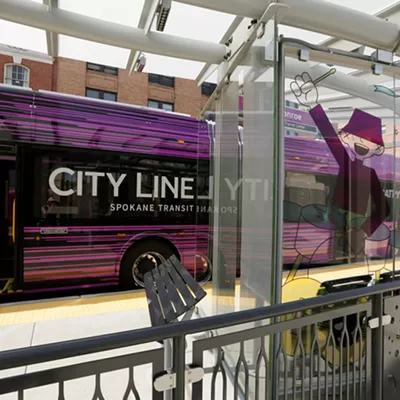The Spokane Transit Authority has an image problem. That probably doesn't come as a surprise to anyone who's lived in this area for more than a year, but what may be a huge surprise is that the STA is starting to do something about it.
At the end of March, the organization announced that it's embarking on a project to strengthen management, streamline operations and engage key stakeholders. And that means you, regardless of whether you ride the bus.
Five community meetings are scheduled for late May, and there is good reason to believe STA means business this time around.
"We have found that over 80 percent support public transportation but only 40 percent support STA," says Al French, city councilman and chair of the newly formed STA Task Force. Those numbers came from exit polling done when STA was trying to pass a ballot measure for more funding. Voters didn't buy it.
"Our ridership only represents five percent of the voting public," says French. "Voters basically said, 'We don't like what you are doing.' STA has a credibility gap with the community."
Since then, STA has hired Kim Zentz -- formerly of Avista -- as its new CEO, replacing Robert Allen Schweim, who ran the agency for two decades.
"We are hoping to gather as much information as possible from the public at these meetings, from key legislators and [from] other stakeholders we will do in-depth interviews with, so we can find out what exactly it is people want from us," says Zentz. "The information-gathering will be done by the end of June, and we will be ready to present the recommendations in the early fall. Any route changes will be presented by early 2004."
Internally, Zentz has taken a critical look not just at management, but also at customer service, listening to and implementing suggestions coming from the very frontline of STA. It's a work still in progress.
"I'm trying to make a leaner and stronger organization," she explains. "I brought a new process to how we allocate our dollars, and I'm looking for broader input and clearer justification before we go forward with new investments."
This won't happen overnight.
"You are looking at 21 years of cultural entrenchment, and now you are getting new bosses. There will be some anxiety," says French.
As for the public comments, and the changes that may follow in their wake, absolutely nothing is sacred.
"The name of the organization, the color of the buses, the size of the vehicles, the routes, anything goes," says French. "And there are no institutional sacred cows either -- even the STA Plaza is on the table. Perhaps we need three hubs instead of just one downtown."
Light rail should be part of this community discussion as well, as should the Downtown Spokane Partnership's idea of smaller streetcars that run between downtown and the hospitals.
"It's all about building ridership," says French. "We need a strong bus system to feed into light rail. Or perhaps we don't need light rail at all, but another type of rapid transit system."
Doesn't this just mean that STA is getting ready to approach the voters for more funding?
"No. That's not it. Past public processes have been too narrowly scoped and driven toward a specific outcome," says French. "That's not the case this time around. People will leave the meetings with a sense that they are being heard. We want to know if we are on-target and if not, how we can change to be on-target."
Meetings are scheduled on May 21 at 6:30 pm at Roosevelt Elementary School; on May 22 at 6:30 pm at Sunset Elementary School; on May 28 at 6:30 pm at Rogers High School; on May 29 at 11:30 am at the Spokane Arena's Champions Room; and on May 29 at 6:30 pm at University High School. Comments can also be submitted via the STA's Web site at www.spokanetransit.com or by calling 325-6000.
Publication date: 05/08/03















